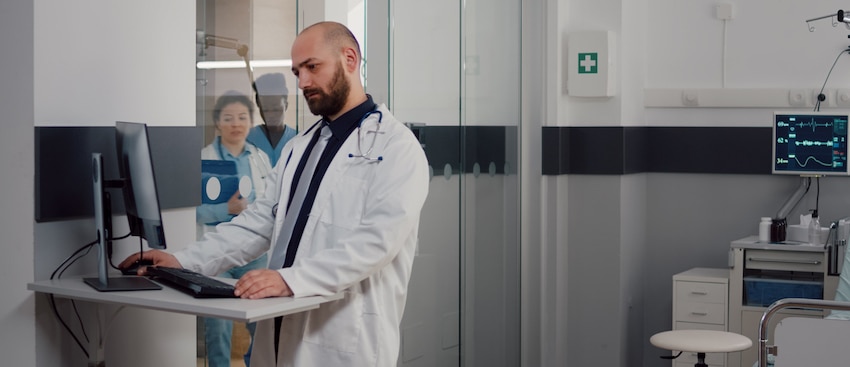
At the highest level, electronic health record (EHR) systems are used to input massive amounts of data; refer to data points, as needed; and analyze outputs through reporting. An EHR consists of raw data for each patient with even small practices and healthcare facilities having large amounts of data to manage. Well-implemented EHR applications allow healthcare organizations to have visibility into this data, and then interpret it and use it in predictive ways.
When physicians, specialists, and other healthcare providers have ready access to comprehensive, accurate data, HealthIT.gov notes, “patients receive better medical care.” EHRs can “improve the ability to diagnose diseases and reduce—even prevent—medical errors, improving patient outcomes.”
Medical professionals can more quickly diagnose problems when access to reliable patient data is readily available. Plus, EHR applications can automatically check for potential conflicts in the prescription of new medications and compare side effects of the medicines against a patient’s allergies. This is always important but especially so if an allergy is life-threatening.
Although optimizing the ability of medical professionals to treat patients is a top priority, an EHR system can also help to address operational issues. When corrected, this frees up time for more efficient, cost-effective operations and creates the right environment for the best patient care.
Finally, besides helping doctors to treat individual patients in the most effective ways possible, EHRs can play a key role in promoting public health to populations.
Even the best EHR system, though, can’t provide the data analysis needed if the data itself isn’t of the cleanest, highest quality—and this highlights the importance of carefully managed, professional EHR data migration when transitioning to a new system. This process comes with plenty of moving parts, and specifics can vary. For example, an EMR data migration to an EHR may have different considerations than switching from one EHR brand to another.
EMR/EHR Data Migration
Steps required include:
- Assessing the current system
- Comparing functionalities between the legacy software and the new one
- Investigating data integrity
- Determining how to convert it for use in the new EHR
- Categorizing your current data; for example:
- How will you address duplicate data?
- What will be cleaned and migrated to the new system?
- What will be archived?
Plus, before you begin, be clear about current data regulations, the sources of current data and their structures, and the general condition of the data. Create a timeline for your EMR data migration and ensure that your network has sufficient capacity for the migration process.
Time and attention put towards these issues at the start of the EHR data migration process will pay off once the new system is live.
Top professionals from our network can help your healthcare organization with your data migration, including for:
- Epic data migration
- Center data migration
- Allsprings data migration
- MEDITECH data migration
- NextGen data migration
Contact us online to talk about how we can help your organization.
Problems with Data Analytics with Poor Data
When data is of poor quality in the first place or is transitioned to the new EHR system in less than optimal ways, the analysis of this data will be substandard. When decisions are made based on poor data, the healthcare organization will likely be dissatisfied with the results and the money spent on the process.
Looked at from another perspective, if the data entering screens are less than intuitive, then data can be incorrectly entered. This means that analysis and decision-making are being performed with information that wasn’t correct in the first place, which can lead to serious medical errors.
Benefits of Data Analytics with Quality Data
With confidence in data integrity, you can leverage aggregated inputs and customize EHR reports to glean key insights. Results can help you to provide better patient care while efficiently managing your healthcare organization. This leads to cost savings all by itself; by factoring in time savings, relying upon solid big data can be even kinder to your bottom line.
When it comes to reporting, your organization should determine what kind of information you want and how you want it delivered. How regularly do you need standardized reporting? What types of one-off reporting might you need, and when?
Over a period of time, your analysts will notice patterns in EHR reporting that might otherwise not rise to their notice. Trends can arise when looking at patient care and outcomes, with doctor and nurse productivity, insurance reimbursements, cycle times, and much more.
Predictive analytics can be used by medical professionals when they’re considering more than one treatment action for a particular patient or a certain disease. Predictive analytics can also help doctors and specialists compare outcomes when a certain treatment is used. When the EHR analytics dashboards are streamlined and user-friendly, professionals can access this data in a shorter amount of time—which can be crucial when making, as just one example, a surgery recommendation.
HealthTECH Resources for EMR Data Migration and More
When your organization needs to manage an EMR data migration project, it’s likely that there will be numerous tasks within the overarching one. It’s also likely that, when you consider each task, you’ll discover staffing gaps or bandwidth issues. If so, that’s not unusual. EHR data migration isn’t a project that’s regularly tackled by a healthcare’s IT department.
Fortunately, this is at the heart of what our boutique-style staff augmentation firm does. In fact, we specialize in only one niche—EMR, EHR, and healthcare IT services—with a professional network of unsurpassed quality. So, whether you need to migrate EHR data or want to optimize your application and create personalized reporting or are looking for EHR analysts, we’ve got you covered. We’ll provide accelerated solutions on even the most stringent timelines. Experts are available as consultants, contract to hire, or permanent placements.
As one of the top healthcare IT staff augmentation agencies in the country, we have 20 years of experience providing top-talent EHR consulting professional to hospitals and other healthcare facilities To get started, please contact us online or call (602) 903-7961.

PRESIDENT/CEO AT HEALTHTECH RESOURCES
Larry has specialized in building strategic healthcare relationships for over 25 years, helping the nation’s top payors and providers solve some of their most pressing business challenges through an intelligent mix of staffing services, training, and consulting.
